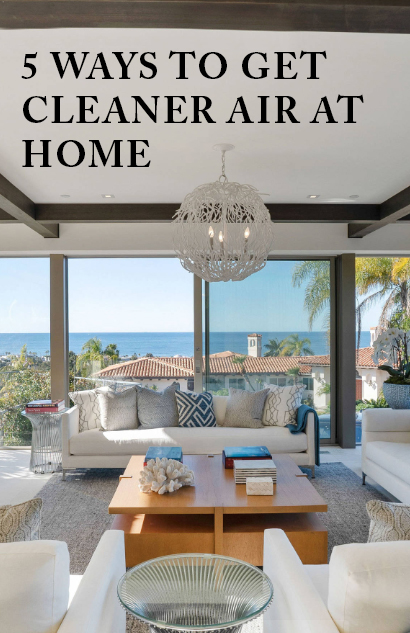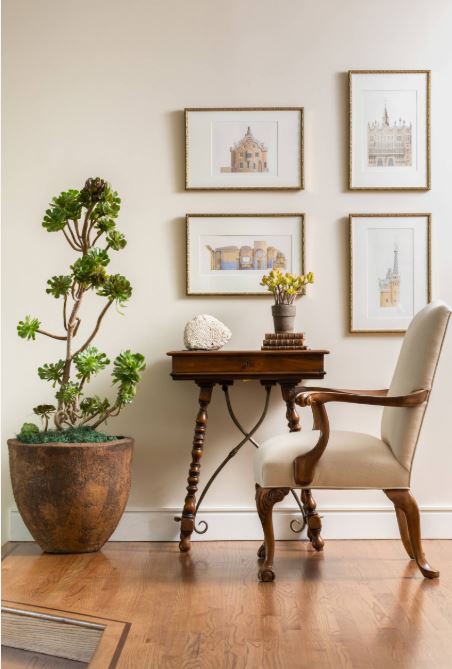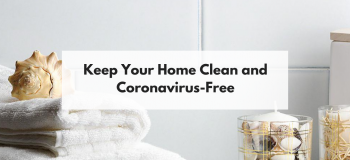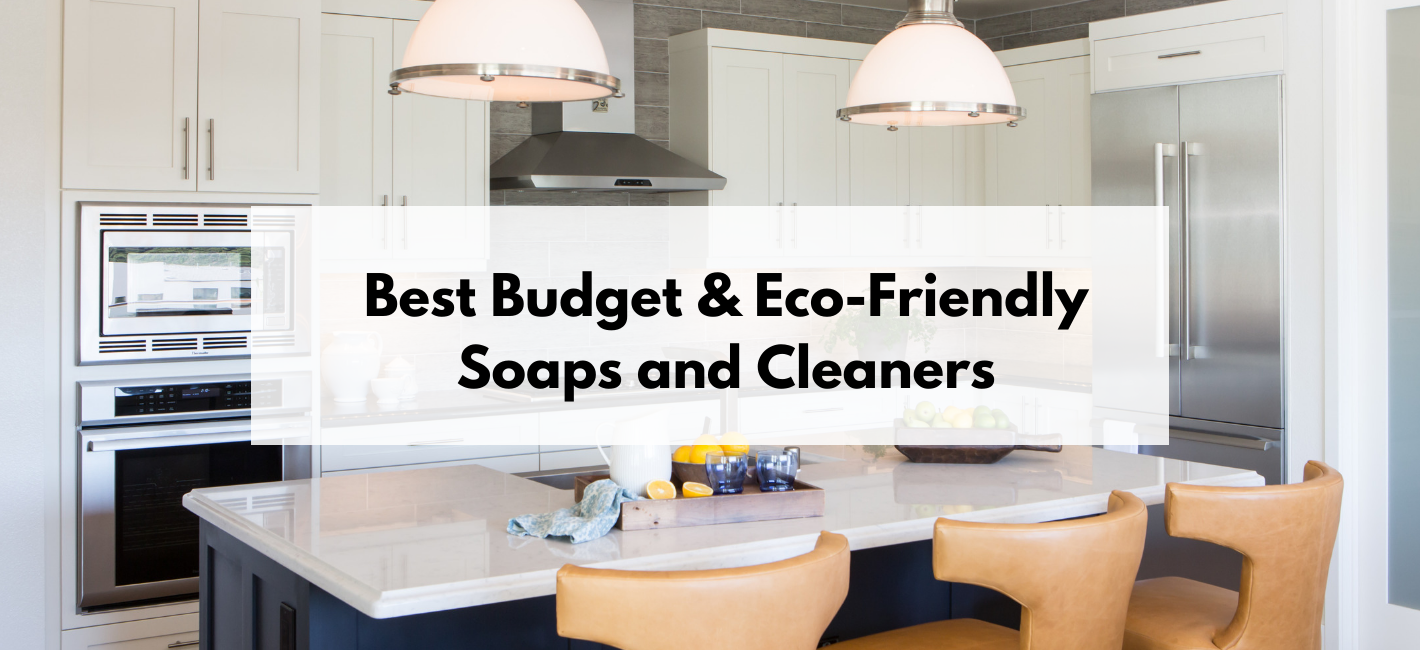We’re all spending more time in our homes trying to avoid catching something nasty from the outside, but oftentimes the air quality inside can be even more hazardous. Typically, we already spend about 90% of our time indoors, whether it’s a house, an office building, or a car. That has a lot of us wondering Can The Air In My House Make Me Sick? Indoor air quality can be some of the biggest toxins to our bodies, anywhere from 2 to 5 times more polluted than the air outside. But don’t freak out! We’ve listed 5 easy ways to get clean air at home so you can stay healthy without breaking the bank.

Why Do I Need Fresh Air?
Indoor toxins can lead to eye, nose and throat irritation, headaches, fatigue and dizziness, and even worse – heart disease, respiratory diseases and cancer. This is one of the reasons I wrote the book on Green Interior Design, where I’ve listed so many accessible resources to help you stay healthy by making your home clean and toxic-free.

Why is Fresh Air Good for Your Health?
Fresh air helps to clear your lungs, strengthens the immune system, digest food, improves blood pressure and heart rate, makes you happier – plus it gives you a sharp mind and energy boost.

How Can I Improve the Air Quality in My Home?
There are many ways to clean the air in your home. For starters, try a few of these ideas.
5 Affordable Ways to Improve the Quality of Your Indoor Air:

1. OPEN YOUR WINDOWS
Why Should You Open Windows for Fresh Air?
Every day, open your windows on each side of the house for a gentle cross breeze and allow the sunlight to pour in. This will flush out stale odors and bring in plenty of fresh air. While you’re at it, leave your bedding unmade to freshen out the sheets before you make the bed. We’d also suggest opening the windows when you’re cooking to avoid breathing in potentially dirty cooking oils, but at the very least run the fan.
Is It Good to Open Windows in the Winter?
Open your windows every day, even in the winter, just for an hour or so. If your windows are hard to manage and difficult to open and close, invest in a new set of windows. This can be a costly endeavor, however new windows will not only increase the value of your home, but will also cut costs in your energy bills for heating and cooling, will reduce noise pollution and upgrade the look of your home. If you’re in the market, give our friends a call at Lion Windows and Doors. They have a wide range of windows, whatever your budget.

2. PLANTS
Plants are another one of the easiest ways to get clean air at home.
Do Plants Clean the Air?
Plants give off the oxygen that we breathe while they breathe in our carbon dioxide. What a team! That’s one reason why our bodies feel so good when we’re outdoors in a forest, surrounded by trees. We can also bring those plants and trees inside our home to help us with our indoor air quality.
What Plants Are Good For The Air?
Here are our Top 10 Plants that Improve Air Quality:
- English or Devil’s Ivy
- Boston Fern
- Elephant Ear
- Rubber Plan
- Chrysanthemum
- Peace Lily
- Aloe
- Snake Plant
- Broad Lady Palm
- Pineapple Plant
If you’re looking for more information on How to Take Care of Your House Plants, we wrote a great blog post filled with tons of tips like How Not To Kill Indoor Plants, What Are Low Maintenance Plants That Don’t Need a Lot of Water, and What the Hell are Dracula Plants (hint: they don’t need a lot of light!). And due to high demand, we followed up on another post Part 2, full of even more useful How-To tips.
3. ESSENTIAL OILS
Do Oil Diffusers Clean Air? and How Can I Purify My Air Naturally?
Essential Oils not only smell great, but they have the ability to kill fungus and bacteria, making them anti-microbial and anti-fungal.
What Essential Oils Clean the Air?
Diffusers work is by heating water and essential oils, which then evaporate into the air we then breathe. Please make sure you’re using high quality organic essential oils that are free of pesticides and herbicides to avoid breathing any additional toxins into your lungs.
Top 10 Germ Fighting Essential Oils
- Eucalyptus
- Tea Tree
- Peppermint
- Lavender
- Rosemary
- Lemon
- Grapefruit
- Lemongrass
- Oregano
- Basil
Tee Tree and Eucalyptus are the heavy hitters of the bunch, and have been CLINICALLY SHOWN to kill airborne flu viruses.

4. CLEAN YOUR HOUSE
How Clean Should Your House Be?
Try not to obsess and make yourself crazy, feeling like you have to scour your house from top to bottom every day. To stay sane, pick one major task a day that shouldn’t take more than 30 minutes, and tidy up every night so you wake up with a clean and orderly home.
Take off your shoes before you come into the house.
Why Do You Remove Shoes Before Entering a House?
Think of it this way, look around outside on the sidewalks and on the street where you walk to get in and out of your car. Imagine that you’re bringing all that grime inside your home. Dirt, car oil from the street, a squirt of spilled ketchup from a to-go packet. It’s a perfect recipe for dirty floors and carpets that need to be cleaned or replaced more often.
Clean Surfaces and Vacuum
When dirt, dust and particles settle from the air, they land on flat surfaces like counters and floors. Vacuuming not only picks up things like hair, soil and small food bits, but it maintains your rugs and flooring. While we’re on the topic, one of the best things you can do to increase air quality in your home is simply remove carpet altogether and install a hard surface with a natural rug. Carpet tends to trap things you can’t see, like mites, mold spores, dust mites and dirt – things you never would think are there because you just can’t see them.
We recently wrote a post on How to Keep Your Whole House Clean where we give you a checklist, tell you all about DIY Hand Sanitizer, the Best Cleaning Products and more Green Interior Design tips. We also shared our go-to’s on the Best Budget Friendly & Eco Friendly Soaps & Cleaners.
5. AIR PURIFIER or AIR FILTER
Do Air Purifiers Really Work? and What is an Air Purifier Good For?
Air Purifiers work like this: The fan sucks a high percentage of airborne allergens, germs, bacteria, viruses and irritants, filter and clean them, then circulate the clean air back out into the room. They’re also great for getting rid of any odor smells in the air.
What Should I Look For When Buying an Air Purifier?
We always prefer to have a high capacity HEPA Filters in an air purifier. These filters help reduce dust, pollen, pet dander and other allergens. Just keep it on low most of the time and let it do the dirty work for you.
Make sure to follow us on INSTAGRAM for more behind the scenes and extra clean air tips!
5 Easy Ways to Get Clean Air at Home | By Sara Plaisted







